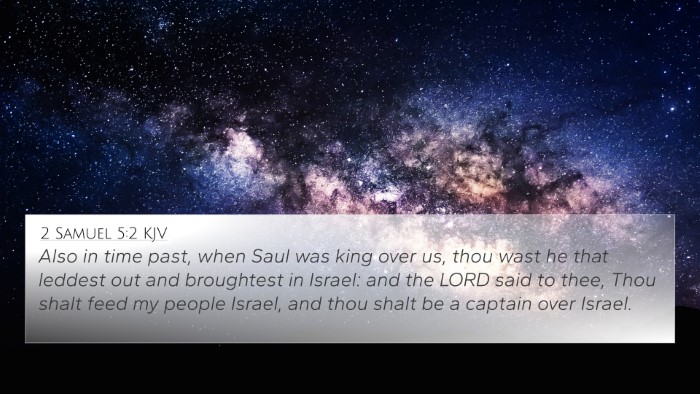Understanding 1 Samuel 18:16
1 Samuel 18:16 states: "But all Israel and Judah loved David, because he went out and came in before them." This verse illustrates the profound admiration that King Saul's son-in-law, David, garnered among the people of Israel and Judah. The context reveals important themes of loyalty, leadership, and the contrasting nature of David's character against Saul's growing jealousy.
Contextual Overview
The period described in 1 Samuel 18 takes place after David's famous victory over Goliath. David's increasing popularity represents a significant turning point in the history of Israel, as it foreshadows his ascension to the throne. Saul's initial appreciation for David turns to envy, creating complex interpersonal dynamics. This echo of admiration from the people serves to highlight David's qualities as a leader and warrior.
Commentary Insights
Matthew Henry's Commentary
Matthew Henry articulates that the people’s affection for David stemmed from his leadership qualities and victories. He points out that David’s capabilities inspired loyalty among the Israelite forces, making him beloved. David's success brought glory to the nation, which further endeared him to the people. Henry warns, however, that Saul's envy foreshadows discord, setting the stage for future conflict.
Albert Barnes' Commentary
Albert Barnes emphasizes the significance of David's role as a leader both in military and civil affairs. He notes that the phrase "went out and came in before them" signifies David's leadership in military campaigns, earning not just victories but also the support and affection of the people. This support ultimately underscored the decline of Saul's acceptance as their king.
Adam Clarke's Commentary
Adam Clarke notes the contrast between the people's love for David and Saul's declining reputation. He attributes David's popularity to his humility and ability to connect with the Israelites on a personal level. Clarke also highlights the potential implications of the people’s affection for David, hinting at the future challenges and divisions it may cause.
Thematic Connections and Cross-References
This verse creates several inter-Biblical dialogues and thematic connections. Notably, it connects to other instances in Scripture where public favor for leaders impacts the dynamics of kingship and loyalty. Below are some key Bible verse cross-references related to this theme:
- 1 Samuel 16:11-13: The anointing of David shows God's choice of David over Saul.
- 2 Samuel 5:1-3: The people of Israel acknowledge David as their king.
- Psalms 78:70-72: Describes David's qualities as a shepherd and leader.
- 1 Chronicles 11:1-10: Further details David's rise and leadership responsibilities.
- 1 Samuel 24:5-6: Highlights David’s respect for Saul, showing humility.
- 1 Kings 1:39-40: The people's anointing of Solomon reflects similar themes of loyalty.
- Luke 1:32-33: Prophecy about Jesus’ eternal kingdom connects to David's line.
Connections Between Bible Verses
The relationship between 1 Samuel 18:16 and other scriptures reflects a broader theme in Scripture regarding the dynamics of leadership, community support, and divine purpose. Notably:
- David's rise contrasted with Saul's fall: Implies the changing landscape of leadership as God’s chosen plan unfolds.
- Jesus’ lineage from David: Connects with the theme of favorable leadership impacting future generations.
Tools for Bible Cross-Referencing
Understanding the connections between Bible verses enhances comprehension. There are various tools available:
- Bible Concordance: Helps locate specific verses and their thematic relevance.
- Cross-Reference Bible Study: Guides users through related texts systematically.
- Comprehensive Bible Cross-Reference Materials: Provide in-depth studies on linked verses.
Conclusion
In summary, 1 Samuel 18:16 encapsulates a pivotal moment in David’s life that influences future events in the history of Israel. By recognizing the admiration of David by Israel and Judah, we can draw important conclusions about the qualities that define successful leadership as seen through a Biblical lens. As believers and scholars engage in cross-referencing biblical texts, they uncover rich insights and interconnected themes that deepen their understanding of God’s word.








